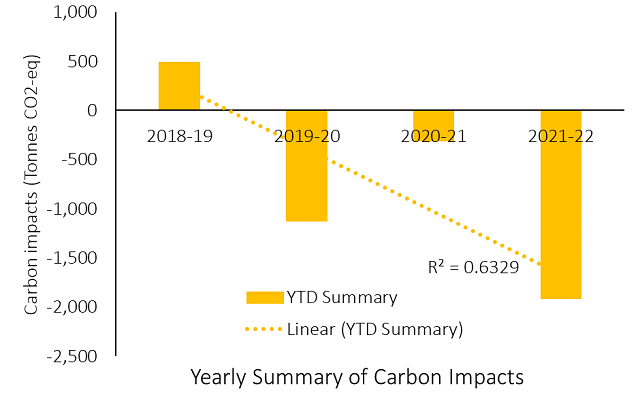With COP27 taking place currently, carbon, net-zero and anthropogenic climate change are much higher up on the news agenda than they are normally. At FRM, these principles underpin everything that we do.
Our carbon specialists have been busy working on some very interesting offerings that empower our clients with the tools and knowledge to quantify historic impacts and make informed decisions about their present and future waste management operations.
FRM have recently been commissioned by Councils (including Norfolk County Council & North West Leicestershire District Council) to create ‘Carbon Calculators’ for their waste management systems. As part of this FRM offering, we create bespoke and tailored carbon calculators in-line with the needs of our clients, which allows them to firstly understand their baseline carbon emissions and to enable them to plan ahead for the future and observe the impact of making waste management decisions on the carbon footprint of the service.
We do the above by including the impacts of recycling, treating and disposing of the waste and pair these with the transport element as well as any energy and water use at the facilities (e.g. depots, HWRCs) to quantify the associated carbon emissions. This is important for waste management decisions, however for national (and other) reporting the recycling benefit (for example) will sit with the users of the recycled material, not the local authorities, and so the outputs can switch on or off elements such as this, providing flexibility for whichever reporting output is required.
Our calculators are designed to be taken away by our clients, with a video tutorial, so that they can easily use the outputs derived from our tools and input data themselves for following years. We also like to include a quick metrics section whereby annual, quarterly, per household and per capita reports can be obtained which may be useful for tight deadlines and urgent reporting needs.
As our tools are tailored to the specification of our clients, we can agree how broad a scope of services that is included in the calculator. In two tier areas for example, a District Council may wish to see the carbon impacts from the collection side only or be able to also incorporate the disposal aspect in their reporting. We build this functionality within the tool so that this can allow officers to set out the evidence behind options and decisions that are within the control of the authority, and if appropriate, perhaps influence decisions outside of immediate control whereby beneficial outcomes can be achieved to reduce the ‘overall’ carbon impacts of a service. One example might be increasing the efficiency of the collection rounds, or switching the fuel type which can improve the carbon performance for the WCA’s transport element of the service. Another might be, choosing closer sites for recycling, treatment and disposal whereby the transport impacts can be reduced. The tool can also illustrate the impact of diverting residual waste away from disposal into recycling or alternative treatment options.
The calculators can include a number of features (depending on client needs) such as:
- type of fuels for collection vehicles;
- scope of transport involved;
- energy use at the depots / HWRCs, as well as benefits from having renewable energy sources on site;
- Household waste recycling centre performance
- Recycling scheme performance
- Food waste collection and treatment
- Residual waste treatment and disposal

As part of our Carbon Calculators, we also offer written reports, workshop sessions to get you up and running, as well as recorded training tutorials for future reference. We also ensure that you are comfortable with ongoing and future use of the tool and any future updates by offering ad-hoc support for updates and any expansion in functionality.
The choice of outputs and their frequency (e.g. quarterly, yearly) are highly dependent on client needs, which is the main driving factor here. For our clients, these have taken the form of e.g., whole system emissions in tonnes of CO2-equivalent per annum, emissions associated with recycling, treating and disposing of particular materials within the waste stream, emissions associated with WCA-only transport, emissions associated with WCA+WDA transport (i.e., transport associated with collection + transport onto intermediate and final destinations). As an example, a chart detailing annual metrics with a trend line is shown below. With the exception of COVID-19, impacts in 2020-21, the emissions are showing a downward trend in this case.


To conclude, we have been really enjoying working on our Carbon Calculators and helping our clients better understand and improve the carbon impacts of their waste management service. We work with clients to develop bespoke and tailored calculators and provide a full suite of training support to help in this regard.
Get in touch with us to find out how our FRM Carbon Calculators can meet your reporting, planning and KPI needs. E: paul@frithrm.com T: 01746 552423.
Frith Resource Management are an ISO14001 & ISO9001 certified company.













